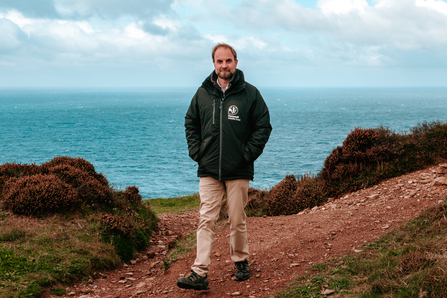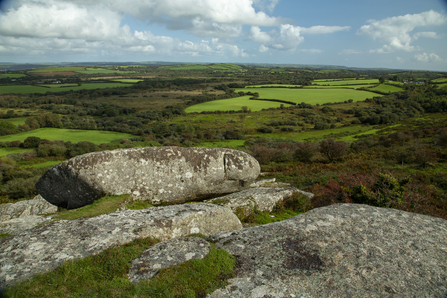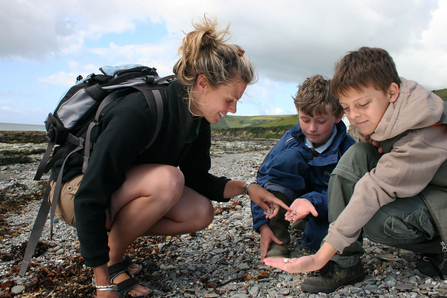9 minute read
Or, you can listen to the full conversation on The Wild Cornwall Podcast, Spotify, or Apple Podcasts
Chough at Lands End, Image by Pete Warman
9 minute read
Or, you can listen to the full conversation on The Wild Cornwall Podcast, Spotify, or Apple Podcasts
It’s fantastic to be back in Cornwall after so many years. I've been so fortunate to get out and see a lot of our work, visiting many of our nature reserves and exploring bits of the county I really didn't know before. That has been phenomenal.
It's been a year of real learning and re-engagement, but also a year of excitement and inspiration. It’s given me greater energy and drive to push forward and ensure we're doing the best we can for nature in Cornwall.
Nature is struggling everywhere. We are in the midst of an ecological crisis – and that's global. So, wherever you go, we're seeing those signs of decline. But that doesn't mean we aren't achieving things. It doesn't mean we aren't making progress. And it certainly doesn't mean we don't have hope.
What I've seen coming back to Cornwall is that more and more people are aware of the issues and the challenges. They’re talking about it and are coming together to do something. That's the thing that really inspires me and gives me hope.
Of course, there are also obviously those wonderful stories. Coming back and discovering that the chough is back in Cornwall is great. It wasn’t here when I was growing up as a child. That's one of those iconic stories. But wherever you look, there are lots of other stories which don’t grab the headlines, but are nonetheless stories of progress and people making a difference. That's the stuff that gives us hope.
It think it’s the different kinds of actions, opportunities and initiatives that are happening. It could be tempting to think it’s just people who belong to a Wildlife Trust who care, but it’s actually far wider. There are lots of different organisations – including huge numbers of community groups, farmers and landowners – who are all doing their bit.
The Council also acknowledge the crisis we're in; they support and engage with things like the Local Nature Partnership, which brings lots of people together to explore, discuss, and collaborate in new ways.
So, perhaps the biggest surprise for me has been that momentum that's there. That's a great thing to build on!

Cornwall Wildlife Trust Chief Executive Matt Walpole, Image by Suzanne Johnson Photography
The best bit of my job is getting out, visiting some of the places and projects where we're working with our teams, supporters, and partners. There’s so much going on!
Last year, with the extraordinary response of our members and supporters, we were able to buy Creney Farm to join to Helman Tor nature reserve. That reserve is now so much bigger and we’re seeing the start of the rewilding and nature recovery work we’re doing there.

A different area is going out with our farm advisors to see the work they're doing with farmers in various catchments around the county. They’re helping those farmers with a range of things from soil testing and understanding fertiliser regimes to thinking about how they can access some of the government funding streams to bring back nature. They're making real difference there! They're helping farmers with their livelihoods as much as they are with nature recovery.
They’re also working with volunteer teams, who are going onto those farms (particularly in areas where there may be County Wildlife Sites) to help keep those areas in good condition. So that juxtaposition of the different things we can bring into those landscapes beyond our reserves is extremely powerful and is achieving real results. We're getting better quality water coming off the land and nature recovery, not to mention good farming outcomes.
Find out more about our farm advice work
Cornwall is in many ways defined by its coastline, which is so long. You’re never very far away from it. Cornwall Wildlife Trust has been working with coastal communities and on marine issues for a very long time.
As with the work on land, there are big inspiring things happening. One of them, of course, this year was the discovery of one of the largest seagrass beds in the UK in St. Austell Bay, through a whole bunch of surveying work that we and others have undertaken. That has to be a highlight because we’ve found something that’s got real value, real power. And what we're now doing is looking at how we can work with the local community, with fishers, farmers and landowners, and others in that area, to bring people together to ensure a strong future for that seagrass bed. Seagrass may not be that well known, but as a habitat it is so rich for nature!
Find out more about the seagrass beds in St. Austell Bay
The other big discovery for me is the work that our Marine team does through The Your Shore Network in engaging and supporting coastal community groups to take action for nature, a programme that's been going on for some 15 years. The vision, the leadership, and the energy in those groups is truly inspiring. All we really do is try and support them on their own journey, and bring them together to learn from each other…but they're out there doing it!

Very much so… though we mustn’t sugar-coat it: there's still a lot of challenge out there. And we're in a difficult time, which we can’t ignore. But if we're going to put nature back at the heart of our societies and our economies, we're not going to do that with pessimism, we have to do it with hope and inspiration.
Well, it was it was a crazy time, wasn't it? Last September, when I’d just started, the government nationally announced a suite of policy measures which were dubbed the ‘attack on nature’. The new announcements seemed to be rolling back on their environmental commitments. Fortunately, a lot of people jumped up and down, rightly pointing out that this seemed wrongheaded for a whole range of reasons.
Being new into the role, I suddenly found myself being interviewed on TV discussing these matters and writing to all of our MPs… and of course, many of our supporters and members did the same thing.
Whilst we may not be totally out of the woods with some of it, one thing is clear: that raising of the voice was a very clear signal to government that the public voters care about nature.
So that was an interesting time – and, for us, deciding how to raise our voice in a constructive way, was an important thing to try to get right. I'm glad that we did.
Find out more about the ‘attack on nature’
Behind that date is a recognition that we don't have a lot of time left to tackle either the ecological crisis or the climate crisis, if we want to avoid really damaging consequences, not only for the planet, but also for all of us.
Our government, like other governments around the world, have adopted goals and targets in the context of their own environmental strategies to achieve certain outcomes, with 2030 as the point at which they're pledging to achieve those things.
We’ve got a decade now when we really need to see action and results. And so, by 2030 there are a range of targets that the government has signed up to, and to which they will be held account. That includes the target to ensure that at least 30% of our land and sea is under good conservation management, and achieving conservation and nature outcomes by 2030. That's the so-called ‘30 by 30’ target which you often see referred to.
So, it's a moment at which governments will be held to account, nationally and internationally. Here in Cornwall, the council is also signed up to achieving these various targets by 2030, through the Local Nature Partnership. And we as a Wildlife Trust, like many in the conservation movement, are also looking at how we can contribute to those goals.
2030 is a way of focusing the mind: we can't kick the can down the road very much further.
Yes! We very much do. We've been working on this since I started, building on all the great work and momentum built up by our staff, Trustees, members and supporters over the last 60 years. Our ambition is very much to be able to deliver more for nature with others than we can on our own. Our role must be to support, inspire, engage, influence, and enable other people to take meaningful action from nature, in whatever sphere of life that they may be.
So, for example, we'll be working towards not just having our own nature reserves in good condition, but broader nature recovery networks over wider areas of land and sea. And we'll be working with other landowners and marine users to ensure that their action is creating nature recovery, far beyond the boundaries of Cornwall Wildlife Trust’s own reserves.
We need to be engaging with communities, volunteers, businesses, and many others to ensure that in whatever sphere, more people can take action of nature: in their own lives, in their own jobs, in their own roles. That has to be our real focus, and we can't do it alone. What we can do is show the way, because I think the things we do as conservationists can demonstrate what's possible.
We will make our own contributions through the work we do in our reserves and in our wildlife projects. But we've really got to be able to use that to inspire and educate others to use our knowledge to support everybody out there to connect and to act.